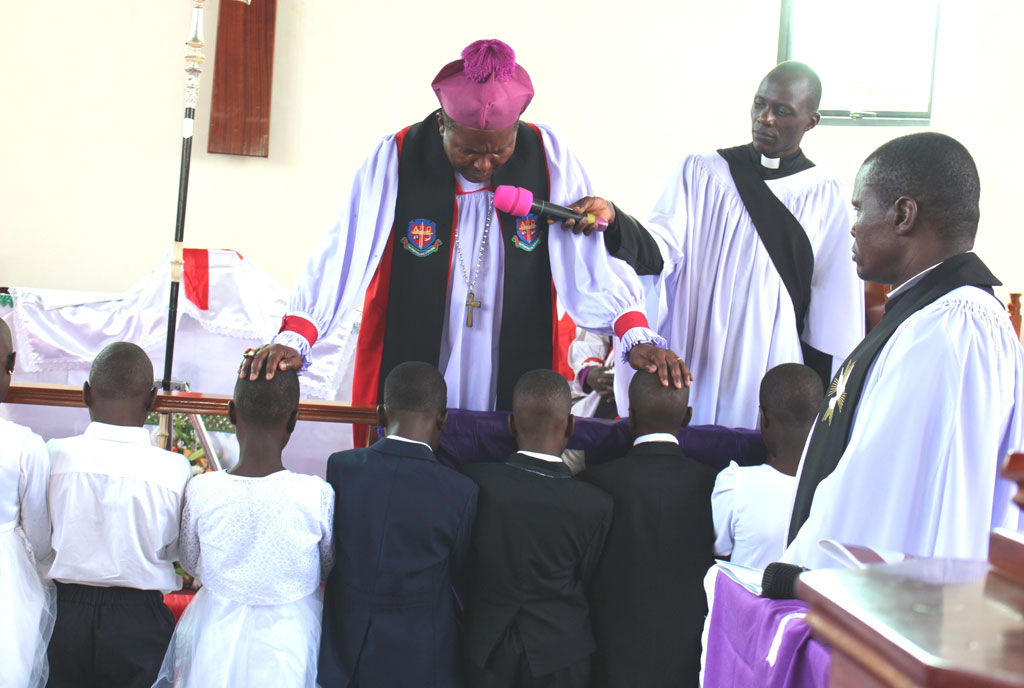We become God’s children by God’s mercy

Bishop Enios Kitto Kagodo confirms children. PHOTO/FILE
What you need to know:
- Wash away sin. At Baptism we are grafted onto Christ, the Vine, become adopted sons and daughters of God.
During the Easter season, Catholics observe the ritual of Baptism. At Baptism we are grafted onto Christ, the Vine, become adopted sons and daughters of God and members of the Church (2 Peter 1:4). The convert participates in Jesus’ passion and enters into the new life as a Christian, sealed in His resurrection. He, now, has access to the holiness and justice of God, which we had lost by the original sin of Adam.
Original sin is a mystery but can be comprehensible. Suppose God had given Adam a treasure to keep for the inheritance of his descendants. But, suppose Adam paid no attention to God and instead wasted the inheritance.
The children would suffer because of their father’s wastefulness. Some people have been rendered landless and homeless, today, owing to greed. God, actually, gave Adam sanctifying grace, to pass on to us. But he lost it through disobedience. Even though we are born innocent of our personal sin, our soul is stained by Adam’s sin.
Only Jesus Christ and His mother, did not inherit original sin. Jesus was the Son of God, not the seed of Adam. To prepare her to be a worthy mother of God’s Son, Mary’s life was full of God’s grace (Luke 1:.28).
When Jesus presented Himself to be baptized by John the Baptist, He transformed the purification ritual of repentance, into the Christian sacrament of Baptism. He is the Lamb of God, who takes away the sin of the world (John 1:29). Jesus alone bestows all the grace which is figuratively represented by outward baptism, because it is He who “sprinkles the conscience” with His blood. It is He also who mortifies the old man, and bestows the Spirit of regeneration.
Jesus explained the necessity of baptism to Nicodemus, “Unless a man be born of water and the Holy Spirit, he cannot enter the kingdom of God.” (John 4). This carries the significance of “being born again”. After His resurrection, Jesus commanded His disciples to baptize, in the Holy Trinity, those who come to believe in Him (Matthew 28:19). Infant baptism falls under parental responsibility, to train up a child in the way of the Lord, and the Church’s response to Jesus’ concern: “Let the children alone, and do not stop them from coming to me” (Matthew 19:14).
About Baptism
Water is the most important outward sign of the sacrament of Baptism. It is just a symbol of New Life in the Trinity and the washing away of prior sin and evil attachments. It recalls the Red Sea, which the Israelis crossed, from slavery in Egypt to the Promised Land (Exodus 14:29-30). During the rite, holy water is poured on the forehead, while saying, “I baptise you in the name of the Father, and of the Son, and of the Holy Spirit.” It recalls Ezekiel 26:25: “I will sprinkle clean water on you”. Water should be clean. But, in an emergency, even dirty water, tea, coffee, carbonated beverages, or beer, may be used. Any person can baptise in an emergency. At a funeral Mass a Christian’s body is sprinkles with holy water; a sacramental of Baptism.
There are two other kinds of Baptism, Baptism of blood and Baptism of desire, and they show God’s infinite mercy. Baptism of blood is received by those unbaptised who die as martyrs for the love of God or for some Christian virtue. Baptism of desire is received by those unbaptised who, sorry for their sins, die desiring either Baptism or the complete will of God, so far as they are able to know it. Even a pagan, if he believes sincerely in one he thinks is God, tries to do his will perfectly and is sorry for his/her sins, probably dies with Baptism of desire.
But Baptism does not take away our human weakness and freedom to sin. We remain fully responsible for the sins we commit after Baptism. We can, however, be forgiven through the sacrament of Reconciliation.
Christians, occasionally renew their baptismal promises, recalling their belonging to a merciful, loving and providing Heavenly Father; sharing in Christ’s victory over Satan, sin and death. No enemy or curse can be against them (Romans 8:31). Hallelujah.
Key message
There are two other kinds of Baptism, Baptism of blood and Baptism of desire, and they show God’s infinite mercy. Baptism of blood is received by those unbaptised who die as martyrs for the love of God or for some Christian virtue.
Baptism of desire is received by those unbaptised who, sorry for their sins, die desiring either Baptism or the complete will of God, so far as they are able to know it. Even a pagan, if he believes sincerely in one he thinks is God, tries to do his will perfectly and is sorry for his/her sins, probably dies with Baptism of desire.





